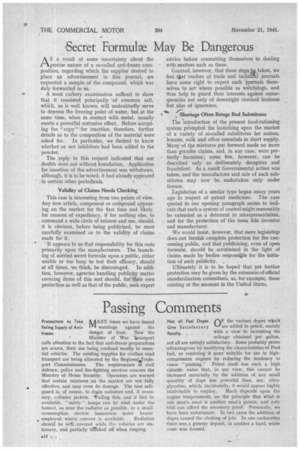8ecret Formulae May Be Dangerous
Page 14

If you've noticed an error in this article please click here to report it so we can fix it.
AS a result of some uncertainty about the precise nature of a so-called anti-freeze composition, regarding which the supplier desired to place an advertisement in this journal, we requested a sample of the compound, which was duly forwarded to us.
A most cuory examination sufficed to show that it consisted principally of common salt, which, as is well known, will undoubtedly serve to depress the freezing point of water, but at the same time, when in contact with metal, usually exerts a powerful corrosive effect. Before accepting the "copy" for insertion, therefore, further details as to the composition of the material were asked for. In particular, we desired to know whether or not inhibitors had been added to the powder.
The reply to this request indicated that our doubts were not without foundation. Application for insertion of the advertisement was withdrawn, although, it is to be noted, it had already appeared in certain other periodicals.
Validity of Claims Needs Checking This case is interesting from two points of view. Any new article, component or compound appearing. on the market for the first time and likely, for reasons of expediency, if for nothing else, to command a wide circle of interest and use, should, it is obvious, before being publicized, be most carefully examined as to the validity of claims made for it.
It appears to us that responsibility for this rests primarily upon the mannfacturers. The launching of untried secret formula upon a public, either unable or too busy -to test their efficacy, should at all times, we think, be discouraged. In addition, however, agencies handling publicity matter covering items of this sort should, for their own protection as well as that of the public, seek expert advice before committing themselves to dealing • with -naatters such as these.
Granted, however, that these steps hptaken, we feel that -readers of trade and techniM1 journals have some right to expect such journals themselves to act where possible as watchdogs, and thus help to guard their interests against consequencies not only of. downright crooked business but also of ignorance.
• Shortage Often Brings Bad Substitutes The introduction of the present food-rationing system pliompted the launching upon the market of a variety of so-called substitutes for onions, lemons, milk and other, essentials in short supply. Many, of the mixtures put forward made no more than genuine claims, and, in any case, were perfecily harmless ; some few, however, can be described only as deliberately deceptive and fraudulent. As a result Governmental action was taken, and the manufacture and sale of such substitutes may now be undertaken only under licence.
Legislation of a similar type began many years ago in respect of patent medicines. The case quoted in our opening paragraph seems to indicate that such a system of control might reasonably be extended as a deterrent to misrepresentation, and for the protection of the bona fide inventor and manufacturer.
We would insist, however, that mere legislatioo does not furnish complete protection for the consuming public, and that publicizing, even of open fortnul, should be scrutinized in the light of claims made by bodies responsible for the initiation of such publicity.
Ultimately it is to be hoped that yet further protection may be given by the extension of official standardization committees, as, for example, those existing at the moment in the United States.




















































